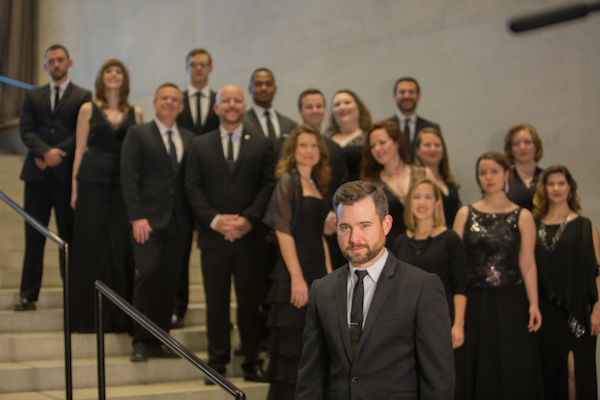Seraphic Fire members take the spotlight in evening of Purcell songs

The opening of Seraphic Fire’s Enlightenment Festival on Thursday night at St. Sophia Greek Orthodox Cathedral in Miami marked an evening of celebration for the chamber choir’s return following cancellation of scheduled concerts in January due to the surge in Covid cases. From the very first notes, the joy of the choir members’ singing once again for a live audience was palpable. “If Music Be the Food of Love” was the Valentine’s Day-related theme of the program, one that proved an impressive solo showcase for many of the fourteen artists on stage.
The music of Henry Purcell dominated the evening with a group of English songs for openers and interludes of Irish songs and harpsichord dance vignettes. Thomas Morley’s “My Bonnie Lass She Smileth” made a rousing prelude. Artist director Patrick Quigley’s skillfully blended the vocal timbres, and the ensemble’s corporate sound emerged full and silvery. John Wiley’s “Weep, Weep Mine Eyes” was a moving testament to loss with vibrant immediacy and a sonorous depth of emotion. By contrast, John Bennet’s “All Creatures Now are Merry-Minded” was festive with the gorgeous sound of the high female voices riding the choral wave.
Three arrangements by Quigley of selections from Moore’s Irish Melodies were a total delight. Patrick Muehleise brought the immediacy of an authentic Irish tenor to a winningly spun rendition of “Believe Me if All These Endearing Young Charms.” It was a pleasure to hear his exceptional lyric instrument again. The purity of Nola Richardson’s soprano took flight in “O, Breathe Not His Name.” Quigley wove the familiar tune of “The Meeting of the Waters” into a lyrical gem.
Purcell’s output was highly varied, and some of his works are formulaic and tedious. But at his best, the English Baroque master was a charmer.
Quigley offered a choice selection of the English Baroque master’s songs and concerted pieces from musical theater works. Rebecca Myers sang “Sweeter than Roses” from Pausanius with light, refined intimacy, the aria’s ornate vocal lines displayed her range. Steven Soph’s tenor was an utter delight in “She Loves and She Confesses Too” from The Mistress, the high notes thrown off with assurance and accuracy. Richardson’s exquisite top tones took center stage for the Shakespearian “If Music Be the Food of Love” from The Twelfth Night. Her flawless vocal technique was aided by her directness of expression, almost like a folk singer.
With Leon Schelhase providing incisive harpsichord accompaniment, five excerpts from Dioclesian marked the return of veteran Seraphic members with some new voices. The warmth of Laura Choi Stuart’s soprano alighted the call and choral response of “Call the Nymphs.” “O, Sweet Delights of Love” was a lilting duo for the contrasting sopranos of Chelsea Helm and Deborah Stephens. Soph’s deft enunciation highlighted his stentorian “Let Monarchs Fight.” John Buffet’s stylishbaritone was in full bloom for “All Our Days and Our Nights.” In the anthemic “Triumph, Victorious Love” the chorus sounded splendid, full and bright toned, with Quigley’s spirited leadership in top form. The trio of James Bass’s deep bass and Muehleise and Soph’s agile tenors were coordinated and balanced with aplomb.
Purcell’s The Fairy Queen is a series of masques performed during a 1692 Restoration version of Shakespeare’s A Midsummer Night’s Dream. The score contains some of his most delightful music.
Four excerpts concluded the concert in mellifluous fashion. Myers’ graceful vocalism in “If Love’s a Sweet Passion” was a prelude to the robust ditty “Now Night is Chased Away,” sung with vigorous thrust by Stuart and the full choir. Amanda Crider’s perfect trills and multi-hued mezzo gave a full account of “Thrice Happy Lovers.” Jonathan Woody’s impressive bass was wonderfully coordinated with Helm and Alexandra Colaizzi’s plangent mezzo for the finale of “They Shall Be as Happy.” Quigley’s nuanced dynamics made the final full-throated outburst all the more effective, ringing the sanctuary.
Seraphic Fire is back and in great form. There are three more performances of this light-hearted program and an all-Bach evening featuring the rarely heard Mass in G minor concludes this mini-festival next week.
Seraphic Fire repeats the program 7:30 p.m. Friday at St. Philip’s Episcopal Church in Coral Gables; 7:30 p.m. Saturday at All Saints Episcopal Church in Fort Lauderdale; and 7:30 p.m. Sunday at All Souls Episcopal Church in Miami Beach. seraphicfire.org
Posted in Performances
Leave a Comment
Fri Feb 18, 2022
at 1:05 pm
No Comments
